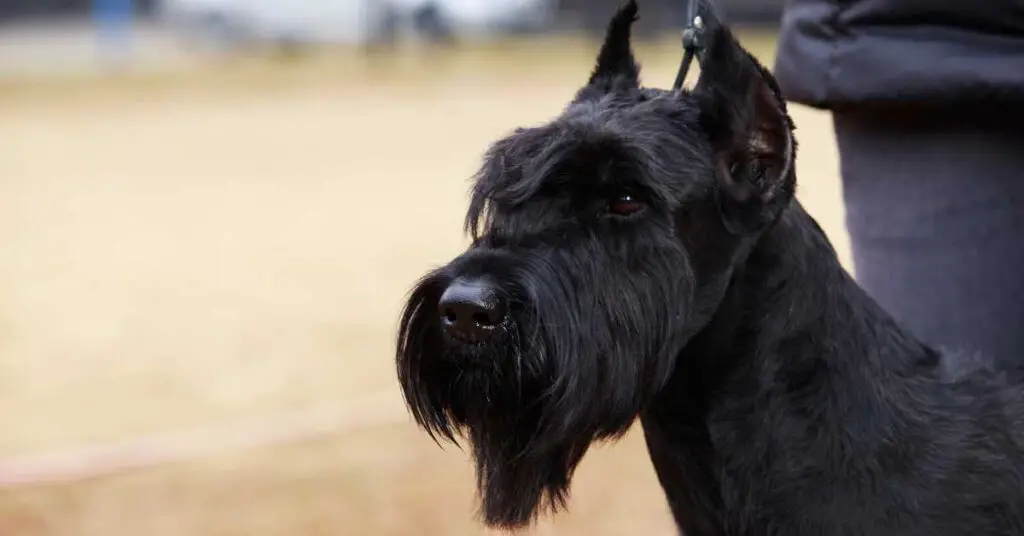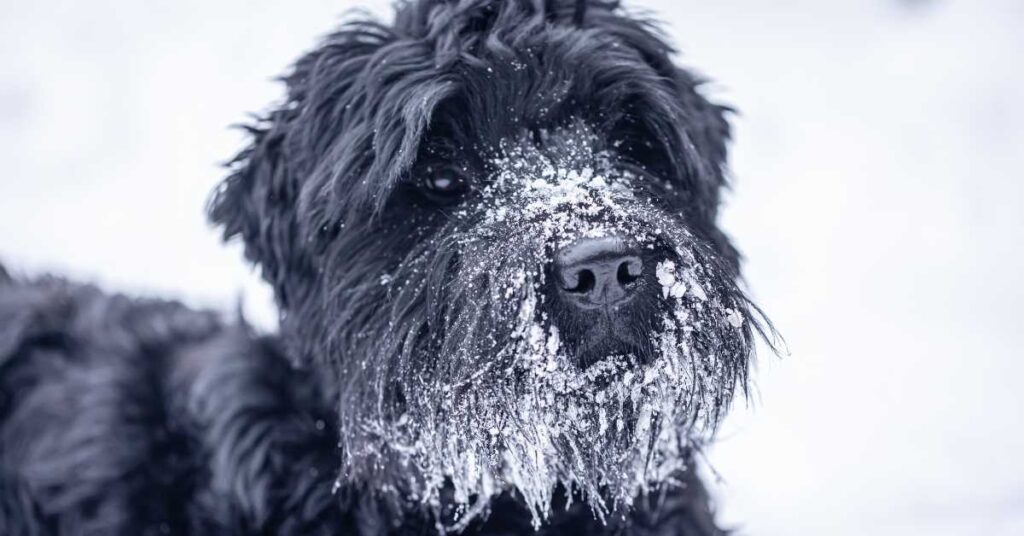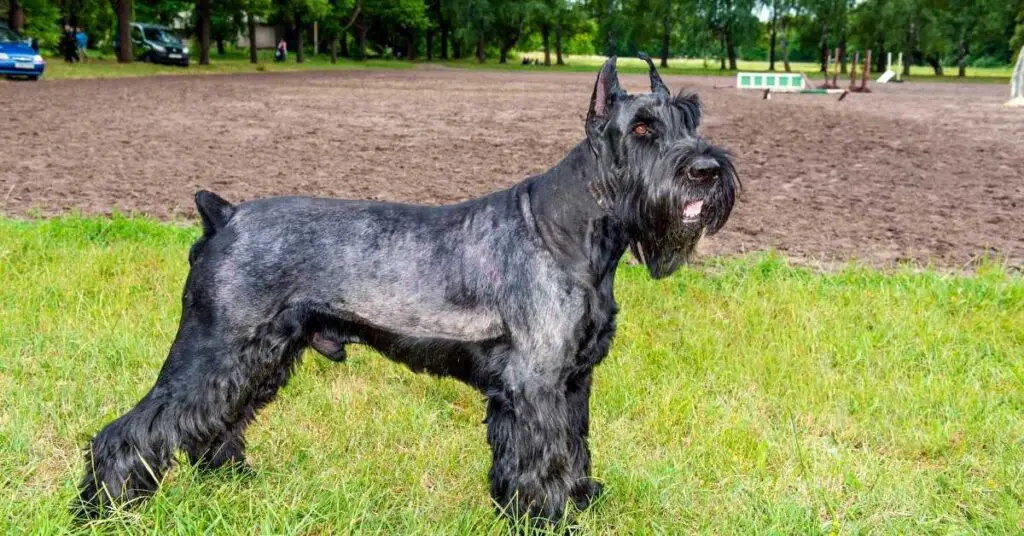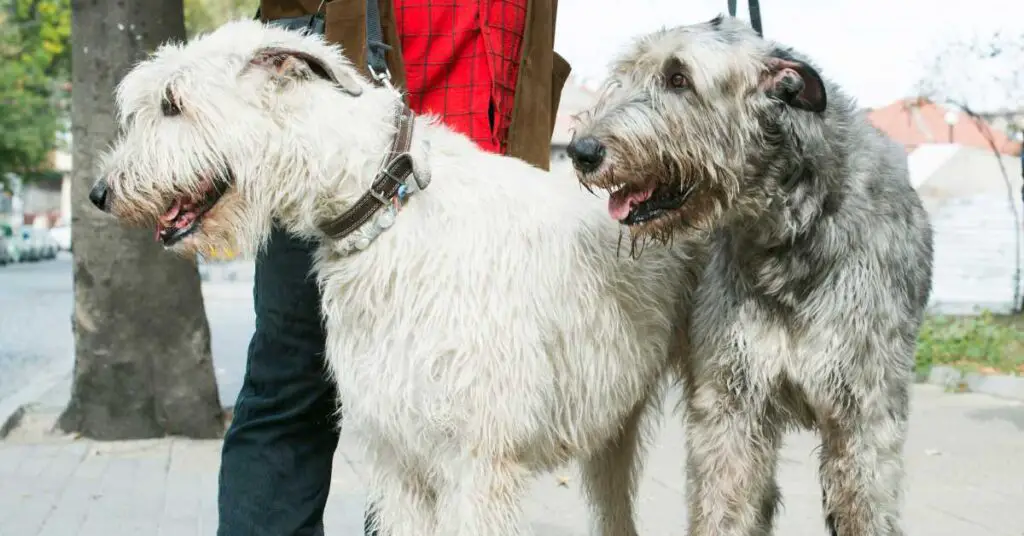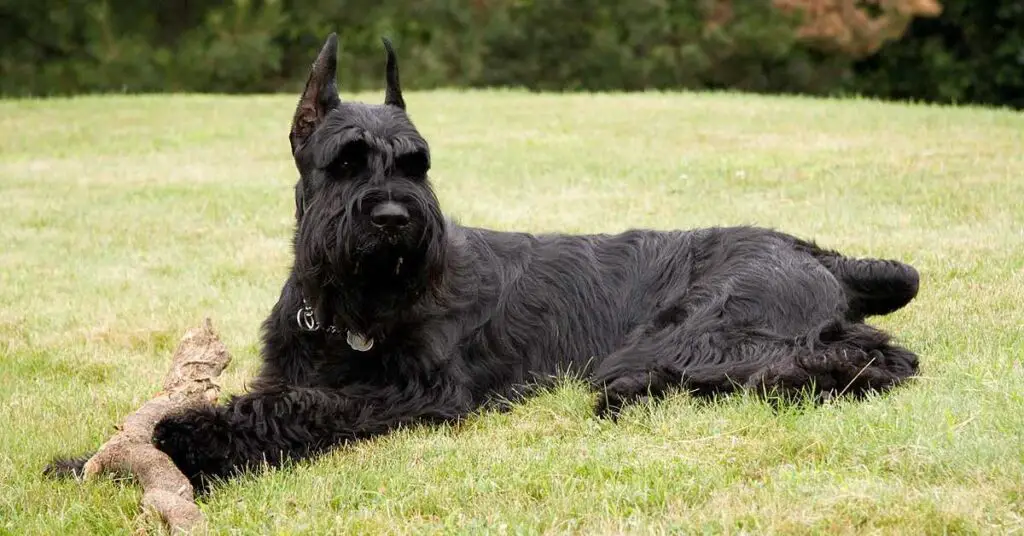Giant Schnauzers, known for their regal appearance and loyal nature, are a breed that requires a thorough understanding to ensure a harmonious relationship.
As with any dog, various factors influence their propensity to bite, including genetics, training, and socialization.
This article aims to provide you with a comprehensive understanding of these factors, along with practical tips and techniques to prevent biting incidents.
By establishing a consistent training routine, socializing your Giant Schnauzer from an early age, and creating a safe and stimulating environment, you can minimize the chances of aggression and foster a loving companionship.
Join us as we navigate the world of Giant Schnauzers and gain the knowledge you need to keep your furry friend and those around them safe and happy.
Key Takeaways
- Factors such as genetics, socialization, training, and environment influence biting tendencies in Giant Schnauzers.
- Fear-based biting can be addressed by identifying triggers and using desensitization techniques.
- Proper training and socialization are essential in preventing biting tendencies in Giant Schnauzers.
- Recognizing body language cues and common triggers, such as stress and anxiety, can help identify and manage biting behavior.
Understanding Giant Schnauzer Behavior
Do giant schnauzers ever get a bad rap for being aggressive? Well, let’s delve into the behavior of these magnificent creatures.
It is important to understand that any dog, regardless of breed, can display fear-based aggression if they feel threatened or unsafe. Giant schnauzers, however, don’t possess a genetic predisposition towards aggression. Like all dogs, their behavior is shaped by their environment and upbringing.
When provided with proper socialization, training, and a loving home, giant schnauzers are known to be loyal, intelligent, and protective companions. It’s crucial to remember that aggression in any dog breed isn’t inherent but rather a result of external factors.
So, if you’re considering adopting a giant schnauzer, ensure they receive the right care, training, and love to foster a happy and well-behaved furry friend.
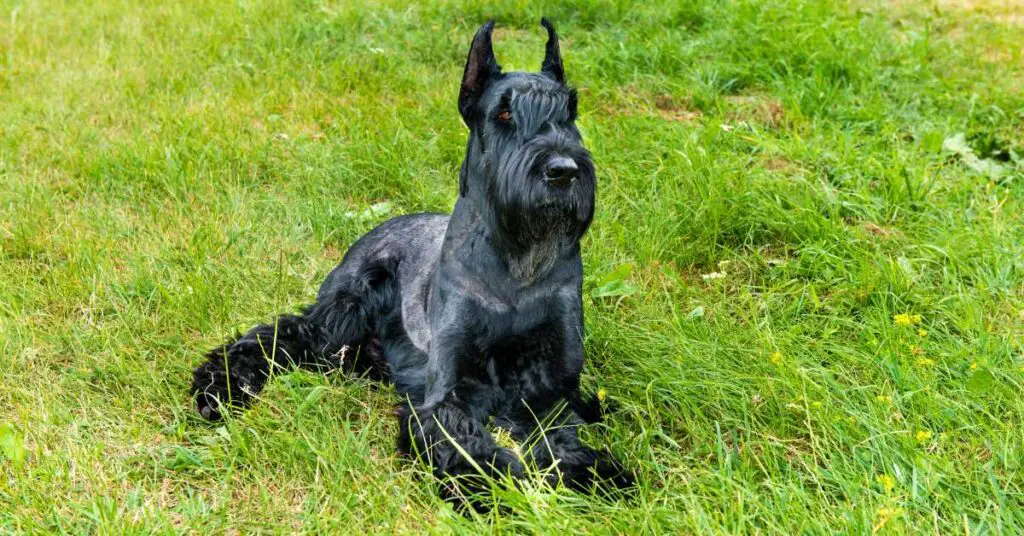
Factors Influencing Biting Tendencies
What factors contribute to a giant schnauzer’s biting tendencies? Understanding the factors that influence a giant schnauzer’s biting tendencies is crucial for responsible pet ownership.
Here are some key factors that can affect aggression in giant schnauzers:
- Genetics: Certain genetic traits or predispositions can make a giant schnauzer more prone to aggressive behavior.
- Socialization: Proper socialization from an early age helps reduce fear-based aggression in giant schnauzers. It exposes them to different people, animals, and environments, teaching them appropriate behavior.
- Training: Consistent and positive training methods can teach giant schnauzers how to control their impulses and respond to commands, reducing the likelihood of biting.
- Environment: A stable and nurturing environment, free from stress and fear, can help prevent aggressive behavior in giant schnauzers.
Addressing fear-based biting involves identifying triggers and using desensitization techniques to help the dog overcome their fears. Seeking professional help from a qualified trainer or behaviorist is essential in addressing any aggression issues.
Proper Training and Socialization
Proper training and socialization are essential for creating a well-behaved and confident giant schnauzer who interacts comfortably with people and other animals. Early socialization plays a crucial role in shaping a dog’s behavior and preventing biting tendencies.
By exposing your giant schnauzer to various environments, people, and animals from a young age, you can help them develop appropriate social skills and reduce the likelihood of aggressive behavior. Additionally, teaching bite inhibition is crucial in preventing bites. This involves teaching your dog to control the force of their bite, so they learn to use their mouth gently during play and interactions.
Consistent training and positive reinforcement can help instill these behaviors, creating a giant schnauzer that is well-adjusted, confident, and less likely to engage in biting behavior.
Early Puppy Training Tips
Get ready to start training your adorable little schnauzer pup! Early obedience training is crucial for setting the foundation for a well-behaved giant schnauzer. Here are some tips to help you with early puppy training:
- Consistency: Establish a regular training schedule and stick to it. This will help your pup understand what’s expected of them.
- Positive reinforcement: Use treats and praise to reward good behavior. This will motivate your pup to repeat the desired actions.
- Socialization: Introduce your pup to different people, animals, and environments from an early age. This will help them become more confident and well-rounded.
- Crate training: Use a crate to create a safe and comfortable space for your pup. This can help with house training and prevent destructive behavior when you’re not around.
- Patience: Remember that training takes time and patience. Be consistent, kind, and understanding with your pup as they learn and grow.
By following these early puppy training tips, you can help your giant schnauzer pup develop into a well-behaved and happy member of your family.
Recognizing Warning Signs of Aggression
Be attentive and observant to recognize any warning signs of aggression in your schnauzer pup, as it’s important to address and correct these behaviors early on.
Recognizing body language cues can help you identify potential aggression in your giant schnauzer. Look for signs such as stiff body posture, raised hackles, intense staring, and a tense or tightly closed mouth. Additionally, growling, snarling, or snapping are clear indicators of aggressive behavior.
If you notice any of these warning signs, it’s crucial to seek professional advice from a qualified dog trainer or behaviorist. They can provide guidance on how to effectively address and manage aggression in your giant schnauzer, ensuring a safe and harmonious environment for both you and your furry companion.
Remember, early intervention is key in preventing aggression from escalating into more serious issues.
Common Triggers for Biting Behavior
Watch out for the firecrackers that set off your schnauzer’s biting behavior.
Giant schnauzers, like any other dog breed, can exhibit biting behavior under certain circumstances. Understanding the common triggers for biting behavior can help prevent potential incidents.
One of the most important factors in managing biting behavior is consistency. Dogs thrive on routine and structure, so maintaining a consistent environment can help reduce stress and anxiety that may lead to biting.
Additionally, positive reinforcement is key. Rewarding good behavior and providing appropriate outlets for energy can help redirect your schnauzer’s focus and prevent potential biting situations. Remember to always use positive reinforcement techniques, as punishment can exacerbate aggression.
By recognizing and addressing these triggers, and by providing consistency and positive reinforcement, you can help ensure a safe and harmonious relationship with your giant schnauzer.
Managing Biting Behavior in Giant Schnauzers
To effectively manage biting behavior in giant schnauzers, it’s crucial to employ consistent training methods and provide positive reinforcement.
Managing biting behavior involves preventing biting incidents and creating a safe environment for both the dog and the people around them.
Start by identifying the triggers that lead to biting behavior and work on desensitizing the dog to these triggers through gradual exposure and positive reinforcement.
It’s important to establish clear boundaries and rules for the dog, and consistently reinforce these through training sessions and daily interactions.
Avoid using punishment or negative reinforcement, as this can escalate aggression and worsen biting behavior. Instead, focus on rewarding good behavior and redirecting the dog’s attention when they show signs of biting.
Consistency, patience, and positive reinforcement are key to effectively managing biting behavior in giant schnauzers.
Working with a Professional Trainer
If you’re struggling to manage the biting behavior of your giant schnauzer, it may be time to consider working with a professional trainer. A professional trainer can provide you with the expertise and guidance needed to address this issue effectively.
They’ll have experience working with a variety of breeds, including giant schnauzers, and can tailor their training methods to suit your dog’s specific needs.
Finding the right training methods is crucial when it comes to addressing biting behavior. A professional trainer will assess your dog’s temperament, behavior patterns, and the underlying causes of their biting. They’ll then develop a personalized training plan that focuses on positive reinforcement and redirection techniques.
By working with a professional trainer, you can ensure that you’re using the most effective and humane methods to address your giant schnauzer’s biting behavior.
Remember, consistency and patience are key when working with a professional trainer. With their guidance, you can create a safe and harmonious environment for both you and your giant schnauzer.
Importance of Consistency and Positive Reinforcement
Consistency and positive reinforcement are essential for effectively addressing and modifying your giant schnauzer’s biting behavior. It’s important to understand that dogs, including giant schnauzers, are creatures of habit, and consistent training helps them learn and understand what’s expected of them.
By consistently using the same commands, gestures, and rewards, your giant schnauzer will begin to associate the desired behavior with positive reinforcement. Positive reinforcement, such as treats, praise, and play, can be powerful motivators for your dog.
It’s crucial to reward your giant schnauzer immediately after displaying the desired behavior, as this helps reinforce the connection between the action and the reward. Consistency and positive reinforcement create a positive and supportive environment for your giant schnauzer, aiding in their understanding and behavior modification.
Creating a Safe and Stimulating Environment
Imagine a world where chew toys were as enticing as your favorite dessert, and your giant schnauzer’s biting tendencies became a thing of the past.
Creating a safe and stimulating environment is crucial in curbing your giant schnauzer’s biting behavior.
Here are three key steps to help you establish daily routines that promote positive habits and discourage biting:
- Provide plenty of appropriate chew toys: Ensuring your giant schnauzer has a variety of chew toys will redirect their biting behavior onto appropriate objects, reducing the likelihood of them biting you or your belongings.
- Set up a structured routine: Dogs thrive on consistency, so establish a daily routine that includes regular exercise, feeding times, and playtime. This will not only keep your giant schnauzer physically stimulated but also mentally satisfied, reducing the urge to bite out of boredom.
- Create a safe space: Designate a specific area where your giant schnauzer can retreat to when they feel overwhelmed or anxious. Fill this space with comfort items like a cozy bed, toys, and soothing music to create a calming environment.
By following these steps and creating a safe and stimulating environment, you can help your giant schnauzer overcome their biting tendencies and foster a happier, more harmonious relationship.
Socializing Your Giant Schnauzer with Other Dogs and People
To enhance your giant schnauzer’s social skills, it’s essential to expose them to various dogs and people in a controlled and supervised manner. Early socialization plays a crucial role in shaping your dog’s behavior and temperament.
By introducing your giant schnauzer to different dogs and people from an early age, you help them build trust and confidence in unfamiliar situations. This exposure allows them to develop appropriate social behaviors and prevent fear or aggression towards others.
When socializing your giant schnauzer, it’s important to create positive experiences. Gradually introduce them to new dogs and people, starting with calm and friendly individuals. Use rewards and praise to reinforce good behavior and help them associate positive outcomes with social interactions.
Supervise their interactions closely, intervening if necessary to prevent any negative experiences.
Remember, socialization is an ongoing process. Continuously expose your giant schnauzer to new situations, people, and dogs to ensure their social skills continue to develop. Building a strong foundation of socialization will help your giant schnauzer feel confident and comfortable in various environments, ultimately leading to a well-rounded and happy companion.
Seeking Professional Help for Biting Issues
If your giant schnauzer’s biting issues persist, it may be necessary for you to seek professional help in order to address and resolve the problem.
Seeking professional guidance can provide you with the necessary tools and knowledge to understand the underlying causes of your dog’s biting behavior. A professional trainer or behaviorist can conduct a thorough assessment to determine the triggers and motivations behind your schnauzer’s biting tendencies. They will then develop a customized training plan to address these issues.
Understanding the underlying causes is crucial in effectively modifying your dog’s behavior. With their expertise, a professional can guide you through positive reinforcement techniques and behavior modification exercises tailored specifically to your giant schnauzer.
By seeking professional help, you can ensure a safe and harmonious relationship between your dog and the people and animals they interact with.
Frequently Asked Questions
What is the average lifespan of a Giant Schnauzer?
The average lifespan of a Giant Schnauzer is around 12 to 15 years. They have a spirited temperament and require regular grooming due to their wiry coat. They make loyal companions for those seeking a strong bond.
Are Giant Schnauzers prone to any specific health issues?
Giant Schnauzers are prone to certain health issues. Regular grooming is key to maintaining their coat, and training is important to keep them well-behaved. By following these tips, you can ensure a healthy and happy Giant Schnauzer.
How much exercise does a Giant Schnauzer require on a daily basis?
To keep a Giant Schnauzer active and healthy, they require daily exercise. Aim for at least 60 minutes of vigorous activity, such as running or playing fetch. Regular walks and mental stimulation are also important to keep them fulfilled.
What is the recommended diet for a Giant Schnauzer?
Gobble up good giant schnauzer grub! Give them a balanced diet rich in protein, fiber, and essential nutrients. Feed them high-quality commercial dog food or consult a veterinarian for a personalized giant schnauzer nutrition plan.
How large do Giant Schnauzers typically grow?
Giant Schnauzers typically grow to an average weight of 60-85 pounds. They have moderate grooming requirements, with a double coat that requires regular brushing and occasional professional grooming to maintain its appearance and health.
Conclusion
In conclusion, it’s clear that giant Schnauzers do have the potential to bite, as do all dogs. However, with proper training, socialization, and consistent positive reinforcement, you can greatly reduce the likelihood of biting incidents.
It’s important to recognize the warning signs of aggression and seek professional help if needed. Remember, owning a giant Schnauzer is a responsibility that requires patience, commitment, and a safe environment.
So, while these majestic creatures may have the capability to bite, with the right approach, you can create a harmonious relationship that’s both rewarding and safe.

